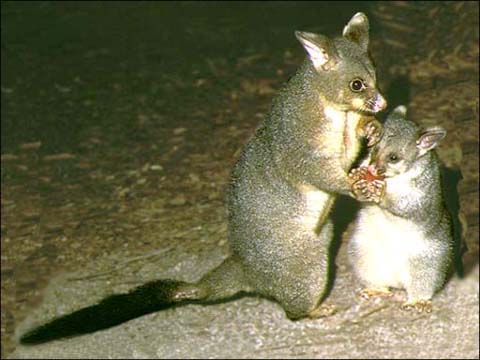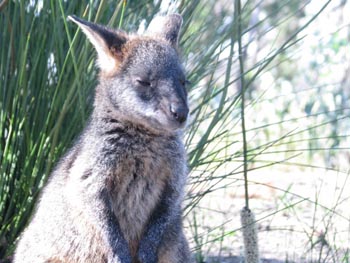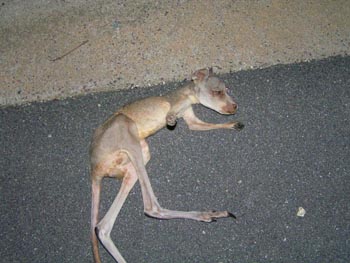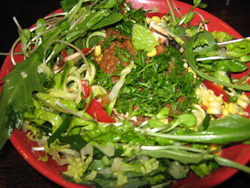Greens Party - Protecting Native Fauna?
REGIONAL AUSTRALIA – Greens Policy Statement
I work with wildlife carers, animal rights activists and wildlife conservationists from Australia and overseas. Recently we came across the new Greens Policy Summary booklet and on p.26 we were horrified to read:-
‘The Greens will … support green businesses which use native species.’
Also
‘The greens will …. Offer financial incentives for sustainable farming systems and improve funding for regional natural resource management.’
The government frequently refers to the ‘sustainable harvesting of renewable resources’ meaning killing kangaroos and native animals.

We don’t have a problem with green businesses using native flora but we do have a problem with businesses using native fauna. It sounds like the Greens party supports the kangaroo and possum killing industries, or may openly do so in the future. In Tasmania the commercial possum industry almost wiped out the ring tail possum – and now they are trying to start up the brush tail possum industry for export to China.
We wrote letters to all the Greens MPs and received back a standard reply saying that basically that ‘this statement should be understood in the context of the greens animal policy which states as a key principle that ‘native animals and their habitats must be protected.’
COMMERCIALISATION OF WILDLIFE
The fact that the greens have no policy expressing opposition to the commercialisation of wildlife is a serious concern. Nor is there any ‘Animal Welfare’ heading in this Policy Summary booklet. In fact right now the Greens in Victoria are trying to lift the ban on commercial kangaroo killing. Meanwhile in the ACT there is yet another horrific government cull of thousands of kangaroos in no less than seven Nature Parks in Canberra – met by total silence from the ACT Greens. Where is the implementation of their policy ‘native animals and their habitat must be protected’?
We are guessing that the motive for introducing this policy of ‘using native species’ is to:-
(a) capture rural votes and/or
(b) replace the livestock industry with a kangaroo industry
RURAL VOTES
If the Greens are trying to capture more rural votes, this is sure to backfire as every animal welfare/animal rights/environmentalist I know who currently votes Green certainly won’t continue to vote Green if this is the case. The Greens will lose more votes than they will gain. Besides there is a new party called the Animal Justice Party - http://www.animaljusticeparty.org - who probably won’t give their preferences to the Greens if they have a policy that could wipe out our national icon.
KANGAROO FARMING
It’s impossible and unviable to replace the livestock industry with the kangaroo industry.
1. Kangaroos cannot be farmed. They are very highly strung animals. They can’t be herded, transported, or have procedures done to them. They suffer stress myopathy and die, their meat becoming rancid. They need 2m high electrified fences, which is very expensive. They need huge areas to exercise and won’t tolerate being kept intensively like livestock.
2. It’s not viable to replace beef with kangaroo meat. Kangaroos have very little edible meat. A fully grown 10 year adult (if you can find one) that weighs 60-70 kg yields only 6.9 kg of meat, 0.25 kg of which is human grade. The majority of kangaroos killed these days are only joeys 2-3 years of age, barely reproductive age, just out of the pouch, who weigh only 21 kg. Compare that with a 2 year old cow weighing 200 kg or a 6 month old lamb weighing 20 kg. To get enough kangaroo meat to replace 1,700,000 tonnes of beef the entire population of kangaroos would need to be killed 566 times over every year.
3. Kangaroos benefit the environment. If you go to www.nokangaroomeat.org you can download a report by the Canberra Sustainability and Environmental Resource Centre in which they list the many ways kangaroos bring benefit to the environment such as:
• eating dry grass that ignites easily in bush fires
• not pulling out roots so areas can regenerate quickly after fires
• having small grazing pressure, only 17-70% that of sheep (therefore more appropriate animal to control grasslands)
• not compacting soil or creating soil erosion meaning waterways are less likely to get silt which lead to woody weed species, resulting in more native flora and therefore habitat for native fauna
• regenerating native grasses – seeds fall into footprint and buried in hole left by toenail. Tail drags behind while grazing pressing ground, rolling seeds into earth.
• Their urine and faeces are natural fertilizers, not high in nitrogen like cows’ faeces which pollutes ground and surface water, causing dead zones in the oceans
• helping give resilience to the ecosystem when species lost. We are in the midst of the 6th mass extinction
Kangaroos are considered a ‘pest’ but in fact they are integral to the biodiversity of the region + help offset damage by livestock and rehabilitate the land after drought and fire.
4. The Greens need to seriously consider the health risks to the community of recommending game meat like kangaroo which is mainly eaten rare or undercooked, dried or cold-smoked because it tends to be tough. According to wildlife pathologist Dr David Obendorf, kangaroo, possum and the meat of native animals contains bacteria, viruses, fungi and parasites (like Trichinosis, cysticercosis and toxoplasmosis) including nematodes that eat muscles. It’s important to remember that many of these parasites are microscopic and cannot be seen by the naked eye:- (Pass out picture here).
Toxoplasmosis:
http://www.tedmontgomery.com/the_eye/eyephotos/toxoplasmosischorioretinitis.html
Trichinosis worm:
http://www.globalhealingcenter.com/images/organisms/trichinella.jpg
Nematode parasites:
http://www.ipm.iastate.edu/ipm/icm/files/images/nematodes.jpg
Recent international scientific reports say that raw game meats are potentially infectious. Russia banned kangaroo meat in August 2009 due to contamination issues (salmonella and ecoli).

A high percentage of wallabies carry toxoplasmosis, besides other wild animals, which causes abortions, infertility and death.
Over the years many people have had acute clinical disease from eating native animals. In 1995 the Womans Day reported a case where 12 people contracted toxoplasmosis from eating rare kangaroo meat one of whom was pregnant and her baby was born blind. In Tasmania a man who ate a lot of game meat contracted inexplicable muscle weakness that went on for years. A NZ tourist got similar infection after eating wallaby meat in Tasmania. In fact Tasmania has endemic trichinosis in its wildlife and 2% Tasmanians have antibodies to muscle-encysting Pseudotrichinosis.
In spite of this the Dept. in Tasmania that permits game meat industry denies any public health risk.
In the last 25 or so years, of 35 new infections in humans, 20 (57%) have been zoonotic in origin (i.e. passed from animal to human) - with devastating consequences.
5) Kangaroos are on track to extinction. The government data gathered on www.stopkangarookilling.org shows that kangaroos are being killed in areas where they are quasi-extinct (<5ksqm2). They need to be in mobs to survive and a mob of 5 is not big enough to ensure their survival.
In areas where they used to be abundant they are now becoming locally extinct. Shooters are hanging up their guns for lack of kangaroos to shoot. Because shooters have killed the biggest males the gene pool has diminished meaning the kangaroos are getting smaller – a lot smaller. From 2001-2006 kangaroo populations fell up to 70% due to the kangaroo industry and the drought yet the quota stayed high. This year it is 3.8 million (which does not include joeys numbering up to 1 million a year).
6. Negative affect on tourism. People come here to see kangaroos and are disappointed not to see them in the wild. Kangaroos are the 2nd most recognised tourist symbol. It’s an $85 billion industry compared to only $270 million to the kangaroo killing industry. Clearly kangaroos are worth more alive than dead.

7. Last but not least, there is the cruelty inherent in this industry. If people only knew how the baby kangaroos are killed they would never support this industry. According to the Code of Conduct for the Humane Killing of Kangaroos it is perfectly fine to take a baby from its dead mother’s pouch and bash it to death against a truck, take a knife and cut off its head or stomp it to death. The at pouch joey that hops away will die of starvation, cold or predation – in terror. It cannot live without its mother for the first 14-18 months. It’s a brutal industry that is unmonitored. Kangaroos are shot at night in the bush – not all are head shot. Some are shot in the neck or body, some have their face blown off and hop away to die of starvation and gangrene, their babies dying when they die. Some are still alive while they are being disembowelled.
This is the largest slaughter of land-based wildlife on the planet happening RIGHT HERE and the GREENS IS DOING NOTHING ABOUT IT! If the greens truly does care about biodiversity, why aren’t they protecting our native species i.e. kangaroos and their habitats like they protect whales? Australia desperately needs a party that will reverse the rampant biodiversity loss that is accelerating out of control.
LIVESTOCK FARMING DESTROYING ENVIRONMENT
We all know how destructive livestock farming is to the environment. According to the Worldwatch Institute, 51% greenhouse gases come from the livestock industry ( http:www.51percent.org ). Additionally, the livestock industry is one of the biggest causes of deforestation. We need forests to seed rainclouds. Forests have a massive impact on climate. The more trees we have the more they shade the ground and their roots aerate the soil. The more trees, the more habitat for biodiversity. Livestock compact the soil causing soil erosion and loss of soil ecosystems. Their waste is high in nitrogen which causes pollution of ground and surface water. The livestock industry uses more than 50% of the water used for all purposes. Did you know that it takes 4,000 glasses of water to make 1 glass of milk and 5,000 gallons of water to make l lb meat but only 25 gallons of water to make l lb wheat? An animal-based diet requires three times more fossil fuels than a plant-based diet and so on (see http://www.earthsave.org )
Given the above, I am wondering why the Greens Party does not have a policy of recommending a plant-based diet? Could the Greens be thinking that the kangaroo industry could replace the livestock industry?
If so, they need to realise that there will never be enough native animals to support or replace all the meat eaten from sheep, cows, pigs and chickens without them being driven to extinction. If every Australian ate kangaroo only once a week, we would need to kill 96 million kangaroos a year, which is 4 times more kangaroos than exist today. Clearly, not a sustainable choice for 7 billion people most of whom want to eat flesh.
AUSTRALIAN ATTITUDE TO WILDLIFE
Australia is desperately overdue for a makeover when it comes to our attitude to our iconic native animals which get a bad rap for being pests, in plague proportion, attacking cars on the road, attacking dogs etc. Because of this we have the worst record of wildlife extinctions on the planet. We are in the midst of a 6th Mass Extinction event. The government's policy of sustainable harvest of renewable resources being applied to living sentient beings with strong bonds to their young and ability to feel emotions is so wrong and there is a crying need for a party who will stand up for them. Will it be the Greens?
THE GREENEST SOLUTION – A PLANT-BASED DIET

For the Greens to potentially advocate eating native animals is going in the totally wrong direction. Einstein said “Nothing will benefit mankind or increase his chances of survival than evolution to a vegetarian diet.”
The Greens have a unique opportunity to pave the way forward for a truly sustainable future for Australia by recommending a plant-based diet. I would like to see them take a principled stand based on what is best for the environment, even at the risk of offending those businesses that currently use native animals and those who are culturally addicted to meat and dairy.
See http://www.youtube.com - ‘Food that Kills’.
STEPS TO RESOLUTION
The following are some suggestions for the Greens Party. Please write to them (addresses at end) and ask them to address these important issues right before elections in Australia:-
• Change the statement in the Greens Policy Summary to read ‘The Greens will support green business initiatives which use native flora’ and make a public statement of having done so
• Issue a public statement saying the Greens are opposed to the commercialisation of wildlife and print this in their Greens Policy Summary
• Include in their policy statement the recommendation for a plant-based diet to help the environment, perhaps starting with ‘Meat-Free Monday’
• Protect kangaroos against government culls and actively campaign against the kangaroo, possum and all native animal consumption (since it is in their policy to protect native fauna)
* Oppose unsustainable population growth. This is the single most important factor that is wiping out our wildlife due to encroachment on their habitat.
The Greens have been a very forward-thinking party when it comes to the environment and truly enlightened. But now it’s time for them to be unified with the animal protection groups if they are serious about protecting native habitats and their species. United we stand – divided we fall.
GREENS CONTACTS:
[email protected]
Bob Brown- [email protected]
Christine Milne- [email protected]
Rachel Siewert- [email protected]
Sarah Hanson-Young- [email protected]
Scott Ludlam- [email protected]
ACT: (MLA's)
Amanda Bresnan- [email protected]
Caroline LeCouteur- [email protected]
Meredith Hunter- [email protected]
Shane Rattenbury- [email protected]
NSW: (MLCs)
Ian Cohen- [email protected]
Sylvia Hale- sylvia [email protected]
Lee Rhiannon- [email protected]
John Kaye- [email protected]
SA (MLC):
Mark Parnell- [email protected]
Tas (MHAs):
Kim Booth- [email protected]
Nick McKim- [email protected]
Tim Morris- [email protected]
Cassy O'Connor- [email protected]
Vic (MLCs):
Greg Barber- [email protected]
Sue Pennicuik- [email protected]
Colleen Hartland- [email protected]
WA (MLCs):
Giz Watson- [email protected]
Robin Chapple- [email protected]
Lynn MacLaren- [email protected]
Alison Xamon- [email protected]
Adele Carles- [email protected]

Recent comments